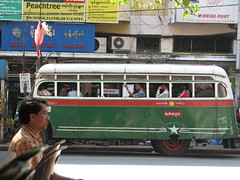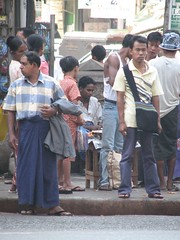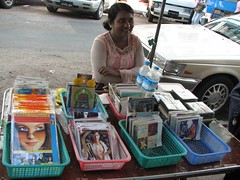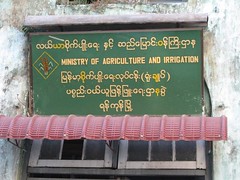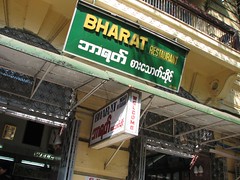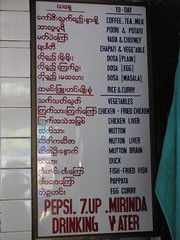Yangon Days, II
10th dec 2006, Sunday, 7pm.
It’s Indian central today. An aftermath of my mum’s instant networking from the day before. Its wonderful, of course, and the Tamils here are incredibly helpful, yet to me it’s a little too self-validating to come to foreign country and immediately immerse yourself in everything that is like home. Thankfully, though, I think Mother realises that I don’t think along the same lines as her. We may be going our separate ways tomorrow.
We went to the Perumal temple where she was last night. It’s ancient ( from the 20s,and true enough has the Reddyar, a well-known Indian philantrophist during the Raj, as the main patron ), though a kumbhabhishegam is happening coming January. No renovations though, just a repainting of the ancient gopuram, since the place is heritage listed.
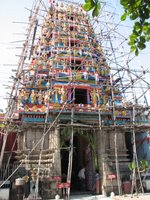
The painted but otherwise untouched Perumal temple Gopuram, Yangon 2006.
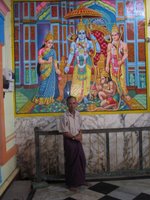
I made a friend in a mute Burmese artist, who apparently has drawn all the murals in the inner parts of the temple. Quite remarkable, in that he’s got the Indian style just right. Even more remarkable is his sign language, which is very understandable, and we had long conversations using just nods and smiles and varied gestures. He wants us to employ him in Malaysia, and indicated repeatedly that he will fly there to see us. The poor man very badly wants to leave.
Our driver ( provided by Bharath restaurant owner Krishnan ) had to go help out his boss, and told us he’d be back at 1pm. We had lunch at the temple, consisting of a banana leaf spread, though the contents were highly doubtful. I had memories of a similar almost inedible meal in Kadayam, my paternal grandmother’s place near Tanjavur, India. But the great feeling of hospitality that we were surrounded by, in the form of total strangers wanting to look after us, more than made up for it.
While we had lunch ( at a table, while the rest sat on the floor ), Mr Mute Artist actually fanned us constantly so that we wouldn’t have to keep swatting flies. It was colonial times all over again. And ironic that I had such lengthy conversations with a mute as compared to the Burmese-speaking locals, all due to the language barrier. Thankfully gestures ( and dance ) is universal. I tipped Mute Artist about 1000kyat. The man didn’t want to receive it, but I insisted. He then indicated that he liked me a lot.
Anyway – we went to the High School just behind the temple, where we believe my grandmother would’ve gone to school. It used to be called the Reddyar High School. There we met an English-speaking gentleman, who led us to the current headmistress. Apparently this is now a state school ( as per nationalisation of everything in the 60s ), and a premier one at that ( no idea how truthful that is ). It all looked incredibly run down though. I took some pictures of the classrooms and the school hall and library. However I did feel something was off. No great moment of truth hitting me, not even a sense of awe at being at the school where my grandmother had studied.
I put it down to the sheer haphazard notion we had about us this day – as is usual with our temperament, there was no planning, and everything was in a jumbled up fashion, therefore the entire experience was passive and unstimulating. I’m quite sad and regretful of it.
Of course, what made it worse was, we were late in getting back, which meant our driver had arrived, found us missing, been given incorrect instructions that we’d be at the Post Office, and had gone looking for us there. The travails of a mobile-less world!
We therefore had to sit there and waste time waiting for him – however Mother left with a Kalaichelvan to a nearby grocery store to get essential supplies for us like coffee and bread and milk and fruits ( and chocolate ), while the Managing Trustee of the temple kept me company. He recounted how the Perumal gets His own donations through diamond merchants who donate in lakhs ( the Indian word for a hundred thousand ). He was also incredibly disinterested in Aung San Suu Kyi. It was the very first time I’ve approached the subject, albeit to a person to whom it means nothing. Quaintly enough, he’d know more about Trichy ( spoken of in awed tones ) than the current state of Myanmar politics. I guess this is one of the truest meanings of diaspora – that a temple trustee in Yangon could be the twin brother of any Iyer in Old Klang Road, KL – all roads lead to Tamil Nadu.
In the meantime, Mute Artist, who was by now my fan, came in with a Sprite equivalent drink in a bottle with a straw, headed straight toward me in a crowd full of temple trustees and administrators and other VIPs, and presented it to me. I was tickled and embarrassed, and poor Mute Artist was again the subject of much teasing, which he endured with a silent non-committal smile.
When Mother returned I had a short conversation with Kalaichelvan, whose casual remarks that the government doesn’t care at all about its locals hit a nerve. It’s one thing reading about it in academic journals, another to have a Burmese-Indian spout it in a throwaway fashion, like it’s a part of the landscape. Everyone keeps saying the streets are safe, that there is absolutely no robbery, but the real reason for this, is that if caught, your life ends. You get thrown into jail, and forgotten, or so he says.
Mother and I have planned to buy 2 things – some lungyis, ( pronounced ‘lohn-jee’ and more of the thanaka, or sandal-like paste on every woman’s face.
Life here is slow – and we’re talking central Yangon. The trustee felt these days time flies by, so I shudder to think how life must’ve been in my grandmother’s times. It’s understandable that her entire childhood existence would be around just one neighbourhood. That her universe was only a few blocks in size. Especially being the daughter of a migrant Indian post-master. Naturally her world revolved around the ‘donnai’ of the Perumal temple in Maargazhi, around the wooden desks of her classroom ( which she stopped going to once she was of marriageable age ) and her upper floor home at the post office building. From the letters she kept, her sister Meena’s death from tuberculosis ( or consumption as it was called then ) was common, as was mortality. Meena was apparently the brightest in the family, and her loss was felt by all in the family. Apparently patti’s non-knowledge of her parents’ passing, so soon after her wedding, was a big tragedy in her life. She hadn’t been able to return to her parents’ even once after her wedding, as is usually the case when the wife gets pregnant ( usually with the first child but can be for subsequent children too. It was probably to safeguard against death at childbirth and infant mortality ).
For a woman in her time, it would’ve been a colossal loss, when you’ve married someone you have no idea about, and traveled to a foreign country with him, and then learning that you will never see your parents again. Perhaps that’s why she’s never expressed any desire to return and see Rangoon, and her old places. Perhaps her survival depended on suppressing those memories. Now I understand and appreciate how difficult it might’ve been for her to talk about her Rangoon times with me, when I kept pushing it.
** Handwriting here – English – very cursive, and has lots of curves and rounds and an artistry to it. Very similar to my grandmother’s writing. I believe Reddyar’s was a Tamil school when she was there. (The plaques are now covered by common cardboard notice-boards ). I wonder if the current handwriting style is an influence of the Burmese script. If so, how come it’s similar to Patti’s – unless there’s a general writing style that is so, due to the generally cursive nature of both Tamil and Burmese.
It’s Indian central today. An aftermath of my mum’s instant networking from the day before. Its wonderful, of course, and the Tamils here are incredibly helpful, yet to me it’s a little too self-validating to come to foreign country and immediately immerse yourself in everything that is like home. Thankfully, though, I think Mother realises that I don’t think along the same lines as her. We may be going our separate ways tomorrow.
We went to the Perumal temple where she was last night. It’s ancient ( from the 20s,and true enough has the Reddyar, a well-known Indian philantrophist during the Raj, as the main patron ), though a kumbhabhishegam is happening coming January. No renovations though, just a repainting of the ancient gopuram, since the place is heritage listed.

The painted but otherwise untouched Perumal temple Gopuram, Yangon 2006.

I made a friend in a mute Burmese artist, who apparently has drawn all the murals in the inner parts of the temple. Quite remarkable, in that he’s got the Indian style just right. Even more remarkable is his sign language, which is very understandable, and we had long conversations using just nods and smiles and varied gestures. He wants us to employ him in Malaysia, and indicated repeatedly that he will fly there to see us. The poor man very badly wants to leave.
Our driver ( provided by Bharath restaurant owner Krishnan ) had to go help out his boss, and told us he’d be back at 1pm. We had lunch at the temple, consisting of a banana leaf spread, though the contents were highly doubtful. I had memories of a similar almost inedible meal in Kadayam, my paternal grandmother’s place near Tanjavur, India. But the great feeling of hospitality that we were surrounded by, in the form of total strangers wanting to look after us, more than made up for it.
While we had lunch ( at a table, while the rest sat on the floor ), Mr Mute Artist actually fanned us constantly so that we wouldn’t have to keep swatting flies. It was colonial times all over again. And ironic that I had such lengthy conversations with a mute as compared to the Burmese-speaking locals, all due to the language barrier. Thankfully gestures ( and dance ) is universal. I tipped Mute Artist about 1000kyat. The man didn’t want to receive it, but I insisted. He then indicated that he liked me a lot.
Anyway – we went to the High School just behind the temple, where we believe my grandmother would’ve gone to school. It used to be called the Reddyar High School. There we met an English-speaking gentleman, who led us to the current headmistress. Apparently this is now a state school ( as per nationalisation of everything in the 60s ), and a premier one at that ( no idea how truthful that is ). It all looked incredibly run down though. I took some pictures of the classrooms and the school hall and library. However I did feel something was off. No great moment of truth hitting me, not even a sense of awe at being at the school where my grandmother had studied.
I put it down to the sheer haphazard notion we had about us this day – as is usual with our temperament, there was no planning, and everything was in a jumbled up fashion, therefore the entire experience was passive and unstimulating. I’m quite sad and regretful of it.
Of course, what made it worse was, we were late in getting back, which meant our driver had arrived, found us missing, been given incorrect instructions that we’d be at the Post Office, and had gone looking for us there. The travails of a mobile-less world!
We therefore had to sit there and waste time waiting for him – however Mother left with a Kalaichelvan to a nearby grocery store to get essential supplies for us like coffee and bread and milk and fruits ( and chocolate ), while the Managing Trustee of the temple kept me company. He recounted how the Perumal gets His own donations through diamond merchants who donate in lakhs ( the Indian word for a hundred thousand ). He was also incredibly disinterested in Aung San Suu Kyi. It was the very first time I’ve approached the subject, albeit to a person to whom it means nothing. Quaintly enough, he’d know more about Trichy ( spoken of in awed tones ) than the current state of Myanmar politics. I guess this is one of the truest meanings of diaspora – that a temple trustee in Yangon could be the twin brother of any Iyer in Old Klang Road, KL – all roads lead to Tamil Nadu.
In the meantime, Mute Artist, who was by now my fan, came in with a Sprite equivalent drink in a bottle with a straw, headed straight toward me in a crowd full of temple trustees and administrators and other VIPs, and presented it to me. I was tickled and embarrassed, and poor Mute Artist was again the subject of much teasing, which he endured with a silent non-committal smile.
When Mother returned I had a short conversation with Kalaichelvan, whose casual remarks that the government doesn’t care at all about its locals hit a nerve. It’s one thing reading about it in academic journals, another to have a Burmese-Indian spout it in a throwaway fashion, like it’s a part of the landscape. Everyone keeps saying the streets are safe, that there is absolutely no robbery, but the real reason for this, is that if caught, your life ends. You get thrown into jail, and forgotten, or so he says.
Mother and I have planned to buy 2 things – some lungyis, ( pronounced ‘lohn-jee’ and more of the thanaka, or sandal-like paste on every woman’s face.
Life here is slow – and we’re talking central Yangon. The trustee felt these days time flies by, so I shudder to think how life must’ve been in my grandmother’s times. It’s understandable that her entire childhood existence would be around just one neighbourhood. That her universe was only a few blocks in size. Especially being the daughter of a migrant Indian post-master. Naturally her world revolved around the ‘donnai’ of the Perumal temple in Maargazhi, around the wooden desks of her classroom ( which she stopped going to once she was of marriageable age ) and her upper floor home at the post office building. From the letters she kept, her sister Meena’s death from tuberculosis ( or consumption as it was called then ) was common, as was mortality. Meena was apparently the brightest in the family, and her loss was felt by all in the family. Apparently patti’s non-knowledge of her parents’ passing, so soon after her wedding, was a big tragedy in her life. She hadn’t been able to return to her parents’ even once after her wedding, as is usually the case when the wife gets pregnant ( usually with the first child but can be for subsequent children too. It was probably to safeguard against death at childbirth and infant mortality ).
For a woman in her time, it would’ve been a colossal loss, when you’ve married someone you have no idea about, and traveled to a foreign country with him, and then learning that you will never see your parents again. Perhaps that’s why she’s never expressed any desire to return and see Rangoon, and her old places. Perhaps her survival depended on suppressing those memories. Now I understand and appreciate how difficult it might’ve been for her to talk about her Rangoon times with me, when I kept pushing it.
** Handwriting here – English – very cursive, and has lots of curves and rounds and an artistry to it. Very similar to my grandmother’s writing. I believe Reddyar’s was a Tamil school when she was there. (The plaques are now covered by common cardboard notice-boards ). I wonder if the current handwriting style is an influence of the Burmese script. If so, how come it’s similar to Patti’s – unless there’s a general writing style that is so, due to the generally cursive nature of both Tamil and Burmese.


